The Universe in the University
The Universe in the University
By Chris White, senior professor of English
Every professor at DePauw has a story to tell of the enlivening integration of their professional lives with their teaching, and every student is the beneficiary of this journeying. After graduation, some alumni follow quite closely in their professors’ disciplinary (or interdisciplinary) footsteps. Others translate learned skills and critical thinking from one field to another. And many carry away something more akin to values or traits – like curiosity, inventiveness, a sense of community and collaboration or the means and determination to create positive change – as they forge new paths, expanding the known universe with their own unique vision.
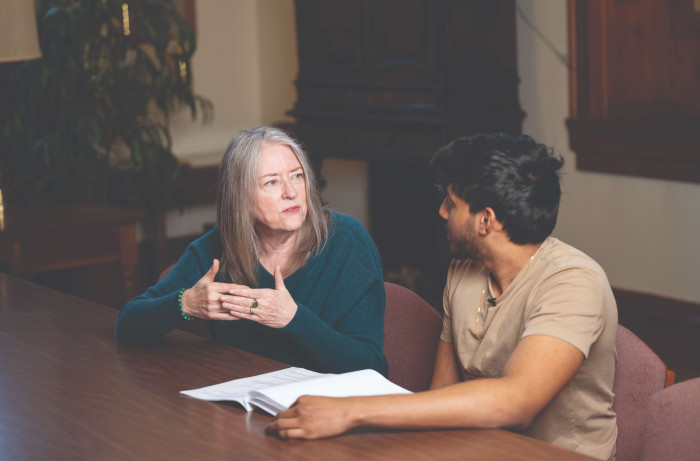
I came late to teaching at the university level. At 40 years old, with an MFA in
dramatic writing, I’d spent years building an active career in writing, music, theatre and film. An essential requirement for me was to find an academic home that took faculty members’ professional lives outside the classroom seriously so that I could continue to widen my artistic world and bring it back to my students.
With little experience working in academia, I also needed a place where I could develop as a teacher. DePauw University’s program in faculty development – the myriad ways in which it exhibits commitment to its faculty members’ growth – was key.
In addition to receiving devoted mentorship and delving into a plethora of workshops on pedagogy, my professional life thrived. Faculty development grants to work on my debut novel were instrumental to its eventual publication by Simon & Schuster. A summer stipend to create a new play led to a stage production, film adaptation and publication by Allyn & Bacon.
Experiences like these raised my creative and academic profile while influencing my course design, informing my advising and making me a more valuable mentor. My teaching, advising and professional ventures are forever intrinsically linked.
Course creation, research and other university projects reach not only across fields of inquiry but also around the globe. The gracious support of DePauw friends and alumni and the university’s commitment to faculty excellence as a key pillar of the Bold & Gold 2027 strategic plan help make this extensive reach possible.
I spoke with six DePauw professors to find out how they maintain momentum in their own professional lives; how they grow as scholars, artists and instructors; and how they benefit from DePauw’s focus on faculty development. Through these discussions, I toured Belgium, Japan, Uganda and the Bahamas. I explored the poetry in the interconnectedness of species, the allure of “cuteness” and the effects of human movement on well-being.
I suppose this is similar to what our students encounter in their professors’ classes – bright constellations of ideas, innovation and expertise from across great cultural, disciplinary and intellectual distances – the universe in the university.
I spoke with six DePauw professors to find out how they maintain momentum in their own professional lives; how they grow as scholars, artists and instructors; and how they benefit from DePauw’s focus on faculty development.
Amy Eremionkhale, assistant professor of business analytics in the School of Business and Leadership, is a prime example of a professor engaging in dynamic, wide-ranging research.
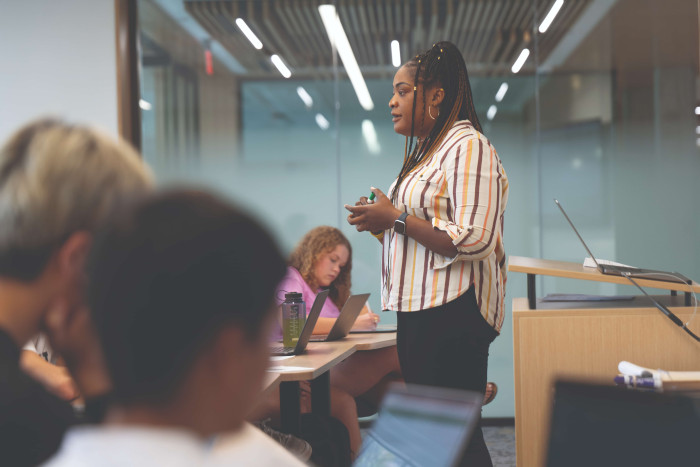
“My diversity of interests, including computational social science and the idea of machine learning, allows me to see things from unique perspectives,” she told me.
Her work in applied econometrics, for example, combines data collection with issues like the economics of healthcare. A research paper published in the Journal of Applied Business and Economics explores patients’ fidelity to their physicians’ treatment plans in relation to how much the patient pays for a doctor visit. Her findings, if put into policy, could impact health outcomes and even life expectancy.
Eremionkhale also co-wrote a paper titled “Fostering Belonging in Economics Education: A Flexible Model for Curriculum Integration,” presented at the American Economic Association. The paper explores the need to humanize and prioritize inclusivity in the theoretical models used in economics classrooms. And with the goal of encouraging more regulation, she’s currently analyzing data from TikTok to see how (and if) companies are interacting with deep fakes in their marketing.
Over the summer, through a DePauw Asher Grant for Social Sciences and a student/faculty summer research grant, Eremionkhale, four of her students and two additional scholars looked at a random sample of 10,000 tweets related to Juneteenth (data collected before Twitter’s transition to X). They worked through a time-intensive classification process, labeling the tweets by hand before feeding them into a supervised machine learning model. That training data helped the algorithm learn to detect patterns, and then the group used a more finely tuned version of the model to classify the rest of the tweets with greater nuance.
“This was the first time a machine learning model was trained specifically on Black American experiences related to Juneteenth,” Eremionkhale said. “Through the research, our goal was to better understand how Juneteenth is emotionally and culturally represented in public discourse, and to help sentiment analysis tools interpret conversations about race and justice more accurately and respectfully.”
Citing her love for the DePauw community, she also has a wish list. “For our applied senior capstone, we hope to enlist alum-run companies where students can work for free, with faculty serving as guardrails,” she said. “And we love when our alums come back to talk about their careers.”
David Alvarez, professor of English, teaches a wide range of courses on Enlightenment literature and philosophy. He was also instrumental in forming DePauw’s Global Studies Fellows Program and is passionate about the value of literature for cross-cultural understanding.
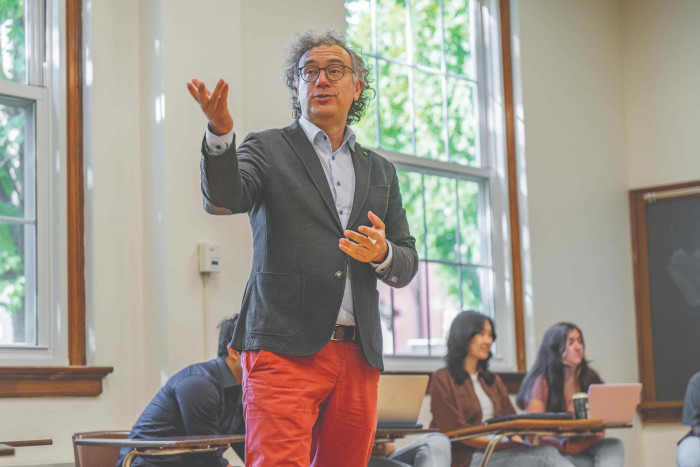
When I Zoomed with him over the summer, he had just completed his second stint
as a Fulbright scholar, this time at Ghent University in Belgium. He finished a book manuscript titled Making Religion Safe for the World: Toleration, Empire and the Formation of the Secular in the Early English Enlightenment. Diciottesimo Secolo, a leading Italian academic journal, will publish part of his research.
Both the European Union parliament and NATO are in Belgium. Alvarez attended receptions or meetings over tea with the U.S. ambassador to Belgium, the U.S. ambassador to the EU, the chargé d’affair of NATO and the prime minister of the Kingdom of Belgium. He also went to events hosted by think tanks such as the German Marshall Fund, which promotes democracy and the trans-Atlantic alliance.
“Some of the most interesting moments for me have been conversations about the U.S. and international politics,” he said.
I asked him how his work applied to the current political situation.
“The class I developed and taught at Ghent, which I’ll offer at DePauw, looks at how Enlightenment-era plays think about religious difference. These plays,” Alvarez explained, “can teach us a lot about the limits and potential of how we practice religious toleration today.”
He also established contacts with universities in Belgium, Portugal and Germany where DePauw students might study abroad, and he made connections for student internships with organizations like NATO, the Vandenberg Coalition and the Foreign Service.
Alvarez brings back to DePauw all he’s learned in his recent travels – to discuss not only literature, but also what it offers regarding urgent matters at home and abroad.
Joe Heithaus is a professor of Engilsh teaching creative writing and literature who also helped lead the Environmental Fellows Program at DePauw. He spent the 2024-25 academic year on a sabbatical that included a month on Eleuthera in the Bahamas. There, he was a visiting poet and writer at The Island School, which offers experiential learning and houses a research station employing two marine ecologists.
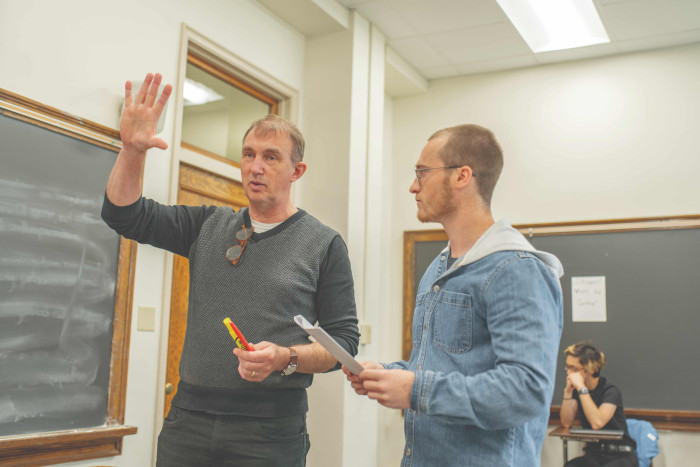
When I spoke with him, he was still brimming with the experience. “I snorkeled a few times in the Green Castle blue hole,” he said with a laugh. “And on Eleuthera, believe it or not, there’s another ‘Greencastle.’”
Heithaus read extensively, kept a daily journal, co-taught classes at the school, watched each sunrise and emerged with a chapbook of original poetry as well as an idea for a first-year seminar called “Trees.”
The book “The Light Eaters” changed his worldview. Another book, The Tangled Tree, Heithaus said, “complicates Darwin’s tree of life,” encouraging him to see humans as composite beings made up of other living things (viruses, bacteria, etc.).
He’s taken four sabbaticals, each transformative. The first was in a French artists colony, in a lived experience of what he’d been reading about all his life, writing poems that seeded collections he would eventually publish.
His second sabbatical included four months in Taos, N.M., watching the shadows of the mountains recede across the high desert, the genesis of a section of his poetry book “Library of My Hands.” His third took place in Monte Verde, Costa Rica, where he became absorbed in both Quaker and scientific communities, staying for nine months and writing personal essays. The New York Times published one of these essays, “Loss in the Clouds.”
“Travel heightens appreciation and attention, and my collective sabbatical experiences have come back to the classroom in deep ways,” Heithaus said. “You know, we think there’s a word for everything, but there is no word for 95 percent of what we experience. The writer’s job is to attempt to find language for the unnamable, which is both frightening and exhilarating.”
“You know, we think there’s a word for everything, but there is no word for 95 percent of what we experience. The writer’s job is to attempt to find language for the unnamable, which is both frightening and exhilarating.”
Hiroko Chiba, professor of Japanese at DePauw, has interests in memory and handwriting in language learning, Anime and robot making. When I spoke with her, she was 13 hours away, in Kyoto, doing research for a winter term course called “Japanese Culture, Technology and Design.”
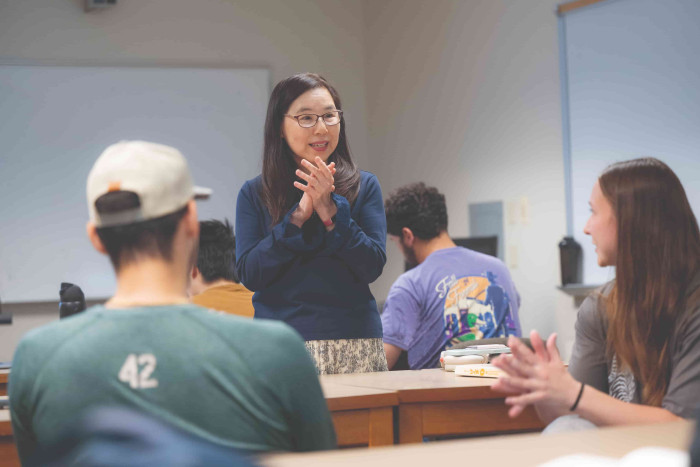
The course will explore “the philosophy of design principles in Japan, the spirit that
goes into everything from crafting a bamboo plate to artwork to robotics engineering in Tokyo,” Chiba said.
Chiba’s spouse is Dave Berque, a DePauw computer science professor and vice president for academic affairs. The couple have a pet dog from Japan that is also a part of their research.
It just happens to be a robot manufactured by Sony.
Chiba and Berque investigate what is most appealing to humans across cultures in such a companion pet and what design principles are in play. Happy, their “puppy,” has a round body and eyes. It remembers faces and voices, does tricks and dances, squats and runs. Around Halloween, it acts a little scary, narrowing its eyes and playing foreboding music.
When I asked professor Chiba if she has developed feelings for Happy, she smiled. “If I stroke her chin or neck, Happy wags her tail,” she said. “You can hold her, and she’s warm. She likes to look at you. She’s become a part of our family.”
Happy is kawaii (the closest English translation is “cute”), a Japanese design principle that describes not only the designed object, but also actions, feelings and relationships. Engineers in Japan work on kawaii-ness.
“I want to call these companion robots a new species, in a way,” Chiba told me, “because they’re different than what they’re based on.”
Through experiments funded by National Science Foundation grants, she and Berque worked with students from DePauw and a Japanese engineering school investigating kawaii versus insect-like “ugliness” in human/machine relationships. One year, they took students to Japan to make their own robots with kawaii attributes.
“In a culture struggling with mental health,” Chiba posited, “might there be a place for robot pets – someone to wait at home for you, run to you when you arrive, make you smile?” Once it’s financially feasible, Chiba thinks there is.
Brian Wright is a professor of kinesiology at DePauw. He has a doctoral degree in human performance and exercise physiology with experience in quantifying competitive training and applied biomechanics.
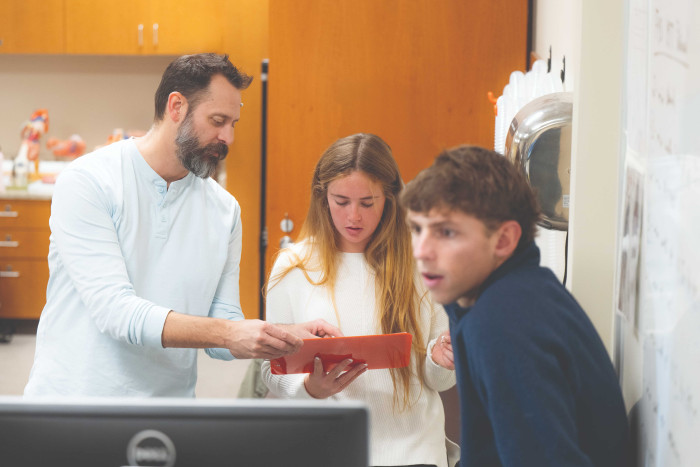
“I’ve always had to defend kinesiology’s existence to those unfamiliar with the field,” he lamented, good-naturedly.
“Students often come to us with athletics, exercise or injury and rehabilitation experience, saying, ‘I want to be a physical therapist and work with athletes,’” he said. “However, time with students allows our faculty to share opportunities with them beyond their initial expectations. We study questions related to the impact movement has on chronic disease, mental health and the quality of life in our communities.
“How do we get middle-schoolers to move their bodies? How does arterial health relate to exercise? How do we create parks in cities that provide urban dwellers with movement opportunities? How do we work to transform our recommendations for health and well-being into policy?”
Faculty/student research opportunities drew Wright to his DePauw position.
One such project quantified the metabolic rate of walking on an inclined treadmill in various body positions with the use of handrail support. Wright advised a senior project on the idea, which then evolved into a first-year seminar course that engaged all its students in research experiences.
Three third-year students mentored the FYS students through the semester. Then they collected more data for a summer research experience, ultimately presenting their findings at the American College of Sports Medicine conference.
Wright’s personal background in swimming led to a recent grant from the California Interscholastic Federation to conduct research on backstroke starting devices, or “wedges.”
“Collaborating with DePauw students as well as colleagues,” he said, “we measured the mechanics of the backstroke racing start to provide governing bodies with information to evaluate safety parameters.”
Wright is excited about the department’s future. “The faculty has the most diverse set of educational backgrounds and academic experiences it’s ever had,” he said. “We have so many ways to talk to students about opportunities in the field they otherwise may have never known existed.”
"Time with students allows our faculty to share opportunities with them beyond their initial expectations."
Sharon Crary, a professor of biochemistry and the first director of the DePauw Global Health Program, has lived a two-pronged professional life, and is now embarking on a third.
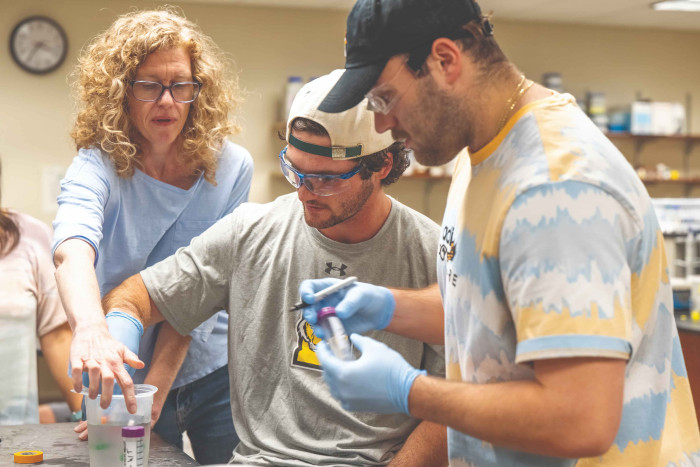
When we talked, she explained that she had begun working in disease research at
a hospital in Lacor in northern Uganda during the Ebola outbreak in 2000. In 2011, she partnered with the hospital through a nonprofit to provide financial and grant writing support. Since then, the hospital has been able to add an orphanage and a home for developmentally disabled children.
Last year, Crary’s work in Uganda came to DePauw. She taught a course titled “Project Development and Health Funding in Uganda,” which she developed during a sabbatical. The course combines School of Business and Leadership priorities with global health concerns to teach real-world skills.
“Students’ final projects required measurables and project deliverables,” Crary said. “I told them I’d take worthy projects back with me to show to the hospital, so the class took on profound meaning.”
One student, for example, wrote a grant proposal for performing sickle cell anemia screenings at birth. Some student projects are already on their way to implementation in Uganda.
Professors’ personal passions often enrich and inform their academic lives. When Crary’s older son was diagnosed with autism in college, she saw the need for better support for neurodiverse students at DePauw.
“I researched current university best practices on neurodiversity and submitted two grant proposals,” Crary told me. “The first was funded last summer. It will create sensory-friendly spaces and social engagement opportunities. The remaining proposal focuses on college transitions and academic skills support.”
Both initiatives call for faculty and staff professional development.
On campus, she worked with an autistic student to create one-pagers for admitted students who are neurodiverse. These resources cover subjects like what to expect in the first few days and what to expect as a continuing student.
“Neurodiverse students don’t get to DePauw without support,” Crary said, “and once they get here, they need to keep getting it. We’re aiming not just for awareness, but for acceptance, welcoming.”
Browse other stories
-
Athletics
-
Men's Tennis - Tigers Blanked by Top-Ranked Big Red
-
Women's Swimming & Diving - Gilbert, Smith, Knott, and Stowe Claim Third in 400 Medley Relay
-
Men's Swimming & Diving - Tigers Swim to Fourth Place for Day Two of NCAC Championships
More Athletics
-
-
News
-
Francesca Seaman Speaks the Language of Mentorship
-
DePauw Announces $10 Million Matching Challenge for Student Scholarships
-
DePauw University Remembers Esteemed President Emeritus Robert G. Bottoms
More News
-
-
People & Profiles
-
Empie, Party of Five: One Family’s Unique DePauw Bond
-
Entrepreneurs Eric Fruth ’02 and Matt DeLeon ’02 Are Running More Than a Business
-
Rick Provine Leaves Legacy of Leadership and Creativity
More People & Profiles
-
-
Have a story idea?
Whether we are writing about the intellectual challenge of our classrooms, a campus life that builds leadership, incredible faculty achievements or the seemingly endless stories of alumni success, we think DePauw has some fun stories to tell.
-
Communications & Marketing
101 E. Seminary St.
Greencastle, IN, 46135-0037
communicate@depauw.eduNews and Media
-
News media: For help with a story, contact:
Bob Weaver, Senior Director of Communications.
bobweaver@depauw.edu.